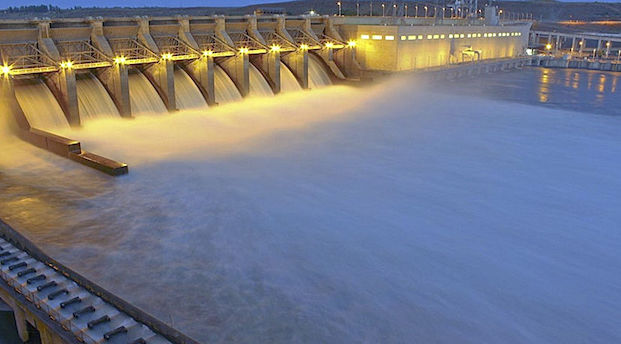forum
library
tutorial
contact

Congressional Field Hearing in Richland
Focuses on Snake River Dam Breaching
by Bob Brawdy
Tri-City Herald, June 27, 2023
|
the film forum library tutorial contact |

|
Congressional Field Hearing in Richland
by Bob Brawdy
|
"Without them, we're in big trouble,"
 Richland, WA -- About 400 Tri-Citians got a riveting lesson on the fast-paced nature of Congressional hearings and political point making in Richland on Monday.
Richland, WA -- About 400 Tri-Citians got a riveting lesson on the fast-paced nature of Congressional hearings and political point making in Richland on Monday.
U.S. Rep. Dan Newhouse, R-Sunnyside, welcomed three fellow Republicans to the Mid-Columbia for a high-profile event that aimed to draw attention to the dangers of breaching the four lower Snake River dams to protect fish.
The small group toured Ice Harbor Dam in the morning, followed by a highly-choreographed "field hearing" at Richland High School in the afternoon.
The event was an official hearing of the House Subcommittee on Water, Wildlife and Fisheries.
It was open to the public but did not include public comments.
The agenda described the proceedings as a look at "The Northwest at risk: the environmentalists' effort to destroy navigation, transportation and access to reliable power."
U.S. Rep. Cliff Bentz of Oregon, the subcommittee's chair, said the stated outcome was to call out the Biden Administration on its pro-breaching agenda and to challenge the secrecy driving a legal process he believes is cutting Congress out of its rightful decision-making role.
"The hearing will establish this panel has no enthusiasm for a breach or draw down," Bentz said at the outset.
Kyle Smith, Snake River director for American Rivers, was disappointed by the one-sided hearing, calling it a "step backwards" from efforts to find common ground.
"I think it was a rehash of a bunch of common talking points that we've heard many times before," Smith said.
David Welch, president of Kintama Research Services in Canada, was one of nine witnesses called to testify. Welch said too little is known about the conditions in the ocean to blame declining fish runs on dams.
The other witnesses were Beth Coffey, Northwest program director for the U.S. Army Corps; Jennifer Quan, regional administrator for NOAA; John Hairston, administrator of the Bonneville Power Administration; Rick Dunn, general manager of Benton Public Utility District; Alex McGregor, president of the McGregor Co. in Colfax; Todd Myers of the Washington Policy Center, Scott Corbitt, general manager of the Port of Lewiston, and Michelle Hennings of Washington Association of Wheat Growers.
McMorris Rogers, the Eastern Washington representative who became chair of the Committee on Energy and Commerce when control of the House shifted to a Republican majority in January, said the region needs more power, not less.
Energy, shipping demands
The dams have a combined capacity of about 3,000 megawatts, though they run at about 1,000 megawatts, rising to 2,000 in high demand periods, such as when California is experiencing a heatwave.
"Without them, we're in big trouble,"
learn more on topics covered in the film
see the video
read the script
learn the songs
discussion forum
